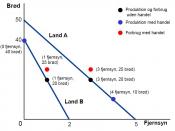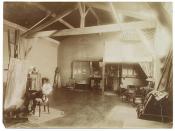Task 1 Comparative Advantage
The basic model of comparative advantage is a static analysis of the production possibility frontier (PPF) curves of two countries that produce two goods. It measures the increase in output due to specialisation and trade. The model implies that free trade will benefit both countries. In the global economy, comparative advantage is dynamic and involves many countries and many products; therefore it is difficult to measure whom, actually gains from free trade and by how much.
Absolute advantage exists when one country can produce all, or a majority of all goods and services. However it is comparative advantage that determines whether trade is beneficial (Pass, Lowes, Davies 1993). Comparative advantage exists when one country can produce a good at a lower opportunity cost that another (McTaggart, Findlay, Parkin 2003).
According to the Pass et. al, the basic assumption of the comparative advantage model is that the factor inputs, and hence, the comparative advantages, are static.
In practice, comparative advantage is dynamic and hence, may change. Examples of influences on comparative advantage are:
1. Government restructuring programs that involve redeployment of resources. Such as when a nation has a comparative advantage in the supply of raw material but embarks on course of industrialisation and value-added manufacturing.
2. International capital movements, technology transfer and relocation of production through multinational companies.
Changes in the PPF of each nation therefore changes over time and hence the comparative advantage also changes. Therefore, the basic model of comparative advantage can only prove the basic principle that free trade increases total consumption and therefore improves standards of living. It is unable to demonstrate or measure the impact of free trade in a dynamic global economy with many products and many countries.
Task 2
Do reductions in domestic protection endanger domestic industries and jobs?...


